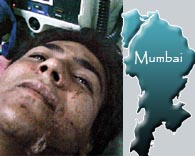Mumbai terrorist Kasab may not spill beans even if given truth serum
 London, Dec. 6 : Indian police and government officials have said that they are likely to give the lone surviving terrorist behind last week’s terror attacks in Mumbai truth serum to make him spill the beans on the entire operation, but experts familiar with the drug and its uses, are skeptical about the results.
London, Dec. 6 : Indian police and government officials have said that they are likely to give the lone surviving terrorist behind last week’s terror attacks in Mumbai truth serum to make him spill the beans on the entire operation, but experts familiar with the drug and its uses, are skeptical about the results.
During police interrogations, Ajmal Amir Kasab has claimed that he hails from Faridkot in Pakistan’s Punjab Province and that he was trained with the Pakistan-based extremist group, Lashkar-e-Taiba.
Also known as narco-analysis, administering psychoactive drugs for interrogation purposes has been around for just under a century, but it has been viewed with skepticism from the start. Indeed, the practice is banned in most democracies, and evidence obtained from such an interrogation would have a hard time making it into an American court.
According to Alison Winter, a science historian at the University of Chicago, who has studied the origins and applications of truth serum, the term that was used to describe the use of certain drugs, most commonly barbiturates like sodium amytal and sodium pentothal, to try to extract truthful statements from people about their past experiences.
“What the term really meant was that the people who used the serum believed that it made people unable to censor themselves and they would just empty their memories into a narrative statement,” she says.
She further goes on to say that its effects were discovered in the early part of the 20th century by Dr. Robert House, an obstetrician who noticed that the popular obstetric anesthetic drug, scopolamine, would put his patients into a state where they would deliver information in a way that seemed automatic.
He didn''t want to use it in interrogation, for the purpose of getting people to admit to criminal acts, so this is a quite different beginning from the association we have now.
It was only later when other people used these drugs that they got the reputation for having the power to force people to provide information against their will.
How did they begin to be used for interrogation? In the 1930s, it first came out that police were using these drugs in interrogations to get suspects to incriminate themselves. But there''s not a lot of documentation of that.
During World War II, these drugs were used in a very different way. They were the first intravenous anesthetics and were used to treat traumatized soldiers who had lost their memories or had aphasia [loss of the ability to speak or process language due to brain injury]. Doctors found that using these drugs would make it easier for people to say what happened, and this helped them feel better.
The idea of a "truth serum" has never been widely accepted. Ever since the 1920s, many judges, psychiatrists, and scientists have rejected the idea that there is a drug that can get memories out intact.
Every time there is a desperate need for information from people, you get speculation about whether these drugs are going to get that information. But you also get consistent warnings that the information may be less reliable than what you would get without the drugs. That skepticism was there right from the start 80 years ago. (ANI)